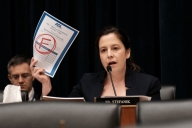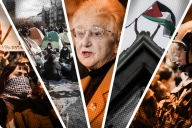You have /5 articles left.
Sign up for a free account or log in.
.jpg?itok=K77n0aBx)
Emboldened after the Dec. 5 hearing on campus antisemitism that led to the downfall of two college presidents, House Republicans have opened multiple investigations and proposed bills to financially punish wealthy colleges and universities.
Photo by Kevin Dietsch/Getty Images
On Wednesday morning, the president of Columbia University will confront a congressional grilling about how she responded to antisemitic incidents on her campus. That may sound familiar, since three presidents of prestigious universities did the same, with notably unfortunate results, back on Dec. 5. Now the majority Republicans on the House Education and Workforce Committee are hoping for a repeat of what they—and many conservatives—considered a blockbuster success.
Columbia president Minouche Shafik, who will be joined by two university trustees, will be aiming to keep her job—unlike two of the three presidents who sat before the committee in December. But judging from the aftermath of that hearing, there’s considerably more at stake than a presidency of one institution.
Join us Wednesday for live analysis of the hearing on antisemitism at Columbia, starting at 10:15 a.m.
Wednesday’s session may well spawn another wave of negative headlines about left-wing, out-of-control colleges and universities, helping to reinforce growing public skepticism about the value of higher education. It could also inspire increased congressional scrutiny of colleges’ internal affairs—probes that may ultimately reach far beyond their responses to the war in Gaza.
Some of higher education’s chief congressional critics notched political and public relations wins in December. The hearing produced viral “gotcha” moments that lawmakers could use for fundraising. Saturday Night Live even made it into a cold open. The presidents of Harvard University and the University of Pennsylvania resigned within a month of what was widely deemed disastrous testimony before the committee.
Republicans on the committee cheered each resignation.
“TWO DOWN,” New York representative Elise Stefanik posted on X, the platform formally down as Twitter, after Harvard President Claudine Gay stepped down. Stefanik, a Harvard graduate, emerged from the first hearing as a conservative star and favorite of former President Donald Trump, raising a record $5.2 million in the fourth quarter of 2023.
Buoyed by the hearing and its aftershocks, the committee and Republican leaders elsewhere in Congress ratcheted up their scrutiny of higher education, proposing bills to levy new taxes on wealthy private colleges and limit institutions’ diversity, equity and inclusive policies. The House Ways and Means Committee opened an investigation into whether a handful of universities, including Harvard, should retain their tax-exempt status in light of antisemitic incidents on their campuses.
Some experts expect to see more probes and more threats to strip federal funding, whether or not Shafik stumbles in her testimony.
“As the Congress is increasingly unable to legislate as a functioning body, investigations are something every chair can lodge,” said Christopher Armstrong, a partner at the law firm Holland & Knight, which advises colleges on how to respond to congressional investigations. “The incentives are aligned toward oversight and investigations.”
Armstrong doesn’t think the congressional scrutiny will stop after this week or be limited to campus antisemitism—even if the Columbia hearing doesn’t produce the same fireworks.
“You are in the crosshairs,” he said of higher education writ large. “There’s immediate risk.”
Since December, Representative Virginia Foxx, the North Carolina Republican who chairs the Education committee, has opened wide-ranging investigations into antisemitism at Harvard, The University of Pennsylvania, Massachusetts Institute of Technology, Columbia, Cornell University, Rutgers University and the University of California, Berkeley. Although these probes have a specific focus thus far, Foxx said earlier this year that the inquiries could broaden to include the universities' diversity, equity and inclusion politics, along with their "learning environments."
As part of its investigations, the committee has requested troves of records about antisemitic incidents, disciplinary decisions and internal communications. Columbia has already turned over 4,000 documents to the committee, according to a committee spokesperson—some of which may provide fodder for questions on Wednesday.
But other institutions haven’t been as forthcoming, at least in the committee’s view.
Harvard was the first to receive a request for documents in early January. The university submitted more than 1,000 pages of documents by the end of that month, a response that Foxx deemed “woefully inadequate.” By mid-February, Harvard’s had yet to meet the committee’s standards, despite turning over more than 2,500 pages. Following through on its threats, the committee subpoenaed three Harvard officials Feb. 15 for all documents and communications about antisemitic incidents at the university since January 2021—among other items. The subpoena was the committee’s first to any college or university. But it may not be the last.
It’s still unclear where all these investigations and hearings will lead. Jon Fansmith, senior vice president of government relations and national engagement at the American Council on Education, said that beyond a pledge to protect Jewish students, the education committee hasn’t explained what it hopes to accomplish. It also hasn’t offered more details about how it would solve the problem of campus antisemitism as opposed to just highlighting it, he said, though Republicans have connected the incidents to universities’ emphasis on DEI.
For now, Fansmith expects that this week’s hearing will be only the second in a series on antisemitism. The leaders of other universities currently under investigation should be prepared to eventually receive an invitation to testify, in his estimation, along with the threat of a subpoena if they don’t accept.
If this week’s hearing is similar to December’s, Fansmith said, the committee’s real intentions will become clear. “If you are the next institution on their list,” he said, you’ll know that “it’s intended to be adversarial and public and intended to create the soundbite."
These dramatic public exchanges won't help institutions address the problems that undeniably exist on U.S. campuses, Fansmith said. But while some sound alarms about the potential consequences for higher education, others—Columbia students among them—are holding out hope that real solutions can come from what happens on Wednesday.
‘New Strain of McCarthyism’
Intense political scrutiny on public colleges and universities is nothing new, says Irene Mulvey, president of the American Association of University Professors (AAUP). But Congress’s new focus on private institutions like Harvard and Columbia represents a serious “escalation,” she said.
Mulvey and AAUP issued a statement Monday afternoon ahead of the hearing, saying the House committee’s interference in higher education must not be tolerated.
“We are witnessing a new strain of McCarthyism in the U.S. where instead of going after Hollywood, it is professors and higher education that are under attack,” she said in a statement. “Like the original McCarthyism, people’s lives are being upended, their careers are being ruined, and they are losing their livelihoods based on narratives being pushed to further a political agenda that have no basis in reality.”
Mulvey and others are worried that the Congressional hearings and investigations could erode academic freedom and limit the ability of colleges and universities to govern themselves—striking at two bedrock principles in higher education. Since Oct. 7, faculty members who have criticized Israel have faced professional repercussions—and now, federal lawmakers have gotten involved with the inner workings of private colleges. Public opinion of higher education, which has already dropped in recent years, could also sink further as a result of the rhetoric from lawmakers and their criticisms of higher education.
When the committee called the presidents of Harvard University, MIT and Penn, to testify in December, the panel’s majority Republicans used the hearing to air conservative grievances about the state of higher education and to paint a monolithic picture of American colleges and universities as hotbeds of liberal indoctrination. They also focused extensively on the spate of antisemitic incidents that have taken place on college campuses since the Oct. 7 attack on Israel and the start of the war. Arab and Muslim students have also reported a rise in Islamophobia since the start of the war, but the committee has thus far only focused on campus antisemitism.
Twenty-three Jewish faculty members at Columbia wrote in a recent opinion piece for the Columbia Daily Spectator that the committee is “leveraging antisemitism in a wider effort to caricature and demonize universities as hotbeds of ‘woke indoctrination.’”
“Its opportunistic use of antisemitism in a moment of crisis is expanding and strengthening longstanding efforts to undermine educational institutions,” the faculty members wrote. They urged Shafik to “defend our shared commitment to universities as sites of learning, critical thinking, and knowledge production against this new McCarthyism.”
‘Not a Good Place to Be’
Foxx, the Education Committee chair, has said that some of the worst cases of campus antisemitism have occurred at Columbia, both before and after Oct. 7. A February letter the committee sent to the university listed several alleged "incidents of antisemitic assaults, harassment, and vandalism" on the campus. Among many others, the incidents include student groups barring "Zionists" from campus events and statements from faculty in support of the “Palestinian resistance."
Jacob Schmeltz, a senior at Columbia and vice president of the national Jewish on Campus Student Union, said he’s hoping that the House committee will get direct answers that he and others on campus have been seeking for months about how campus administrators are responding to instructors who have allegedly created hostile environments for Jewish students. He’d also like to hear some concrete solutions to help ensure Jewish students feel safe.
“This has been a tremendous issue and this has affected nearly all Jewish students on campus,” he said. “We want to hear what the university plans to do about it to ensure that students don’t feel as isolated or marginalized again like we have this year.”
What Schmeltz doesn’t want is a repeat of the December hearing.
“I hope we do not get to the point where the president of Columbia University refuses to say whether calling the genocide against Jewish people is antisemitic,” he said. “I really hope that we don’t get to that point.”
Schmeltz said this academic year has been tough, and while campus demonstrations have calmed down, Columbia is “not a good place to be.” Earlier this month, Columbia suspended students who held an unauthorized event called “Resistance 101” that featured speakers who are known to support terrorism and promote violence, according to the university.
When the committee scheduled this week’s hearing, Schmeltz said he worried that campus events would be weaponized by committee members.
“I really hope that each member of Congress on the Education and Workforce Committee understands Jewish students at Columbia are struggling, and that we do not want to be simply platforms for whatever is going on at the moment,” he said. “We want our experiences to be understood and treated with respect.”







.png?itok=rRo53ZFC)
